Playing Scrabble® with my Mother
by
David Willbern
September 10, 1999
This essay is a play-by-play account, with photo illustrations, of a game of Scrabble® between a precocious six year-old boy and his very patient mother. It aims at an allegorical enactment of the development of language skills as understood by psychoanalytic theories, including Freudian, Lacanian, Kristevan, and object-relations. Words emerge within a contested context of intersecting desires and limits, in a game of simultaneous expression and repression. Personally, I locate the grounds of my own interests in language and word play in this early interactive relation with my mother.
|
Playing SCRABBLE ® with my Mother David Willbern "Within the arena of almost every utterance an intense interaction and struggle between one's own and another's word is being waged, a process in which they oppose or dialogically interanimate each other." "The entry into syntax constitutes a first victory over the mother." "Do crossword puzzles."
|
|||
The time is summer in the early 1950s, hot and dusty on the border between Kansas and Oklahoma. Or it may be winter, dry and cold and bright. Outside there could be a slight breeze or a strong Midwestern thunderstorm. Inside, in a thickly carpeted, air-conditioned living room, it is quiet and temperate, good for concentration. On a fold-out card table more often used for the weekly women's bridge club, two pairs of hands get ready to place small wooden tiles on a thick paper board. One pair belongs to a petite, proper, quietly humorous, fifty-year-old woman. Her fingers are slightly contorted by arthritis, knuckles swollen against heavy rings. The other hands, quick and dexterous, belong to a quiet and precocious six year-old boy. For these players at this moment, the world contracts to a field of 225 squares marked at the center by a black, five-pointed star. Specially coded colored squares of pink and blue crisscross the board diagonally, designating spaces of amplified scoring potential: double letter points, triple word points. Drawn blindly from their protective sack, fourteen smooth wooden tiles recline on their slanted rests, ready for action.1
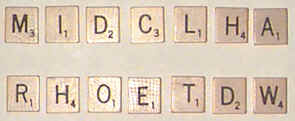
Some letters are ubiquitous workers, always ready for construction: E's, I's, S's. Others are privileged citizens, available under special conditions for limited employment: Q, X, Z. Two are magical: blank, omnipotent, the gap that sutures, one might say. However useful, blank tiles carry no scoring value, only facilitating presence, sovereign substitution.
I begin, placing my tiles so that one occupies the center square:
"How clever," says my mother. And she places her tiles:
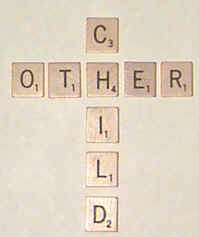
A mysterious smile plays on her face. Quick to see a simple advantage, I add only one tile:
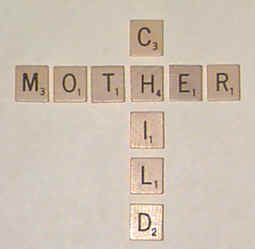
On her next turn, my mother shifts our vocabulary to another register of self-reference. We seem to be playing a type of meta-scrabble.
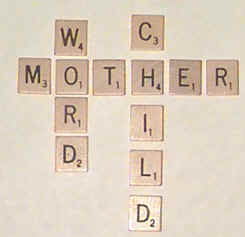
Like most games, SCRABBLE simultaneously teaches possibilities and limits. Today, without consulting The Rules (I haven't played in many years), I recall that there are strict limits on types of words: no proper nouns, no foreign terms, no slang. It was a good game for post-World-War-Two Kansas: a decent, virtuous, Cold War pastime. Within an authorized, hegemonic semantic field, proper standard English could be championed against incursions by outside lexical agitators. (Has the game lost popularity because it's no longer politically correct? Does Bill Bennett play it with his sons?)2 A dictionary, Bible of the word police, should always be on hand to settle disputes. Within this disciplined frame, choices are made in a contested context of decorum and desire. For the game also offers the chance literally to play with words, to test limits, to challenge convention, to joke, to self-consciously avoid improper terms, to flirt with the forbidden. So many words, the child discovers, have four letters.
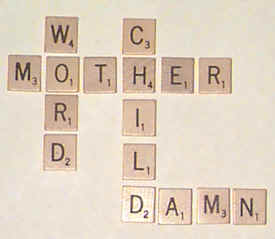
(I was only six.) But although my mother grants me the momentary pleasure of this childish transgression, she won't permit this profanation of the language (her father was a Bible Belt Baptist) nor violation of the rules. I must make another move. Shamed and excited by my censured profanity, I resort to simple addition:
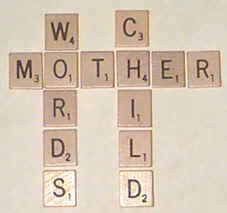
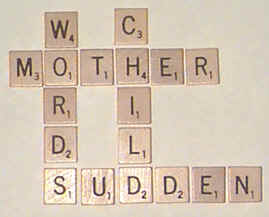
Now an entire range of the board opens below, and I extend myself into it:
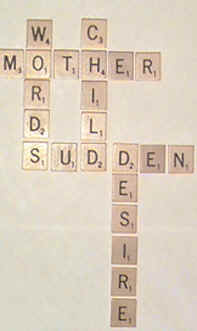
The players next produce two quick antinomies to advance this overdetermined text. I promote assent, while she presents resistance.
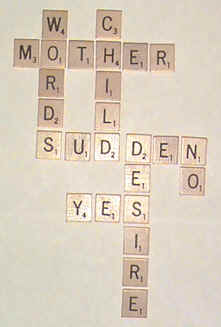
A central feature of SCRABBLE is that opponents are also partners: the "rivals of the watch," to borrow a phrase from the opening scene of Hamlet. As these rivals play, a text is simultaneously co-produced and co-read: it is derived. Generally it's produced and read in terms of the possibility of further production: where can a player's letters be most profitably conjoined to the existing text? Yet it can also be read as a text-in-itself, in terms of reception and not merely production. Once the SCRABBLE board has a few words positioned on it, it could be available for analysis as a kind of poem-in-progress: a text at cross-purposes. One strategy of play produces a lexically arbitrary text, determined by random drawings of letters and the arithmetic of point-count: a computer would maximize this style. Another strategy, however, suggests itself. What about the unconscious components of SCRABBLE textual productions, analogous to the unconscious determinants of OUIJA board productions? What varieties of messages emerge within the playspace of interanimated language? My mother makes her next move.
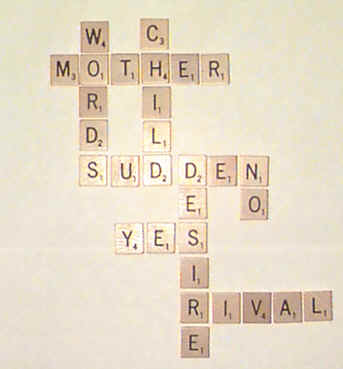
My mother's latest addition (Has she been reading Hamlet ?) elicits a mildly aggressive response, as I transmute words into weapons (S/WORDS):
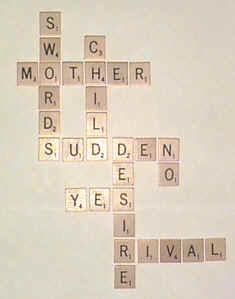
Sensing perhaps that this mock-oedipal drama is getting out of hand (yet, though I would show daggers to her, I would use none), my mother lays down her next word (RULE), to which I quickly respond with childish insistence (NOW):
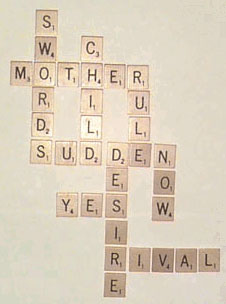
And now my mother, from her deep reservoir of maternal wisdom about life and little boys, offers a compromise by introducing another arena of gratified desire (WISH). Has she been reading Freud?
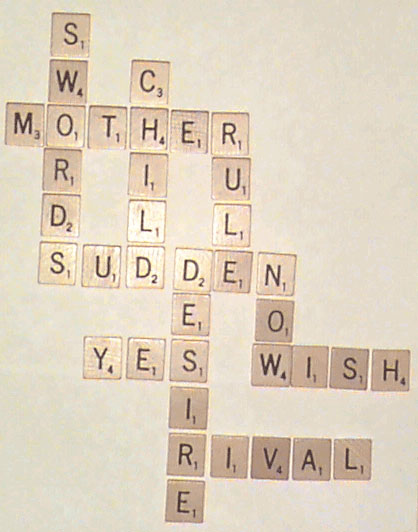
As the scrabbled, cross-purposed text emerges, it explores a field of possibility even as it defines and delimits it: the outside boundary of the board maps a limit to burgeoning significance. In this implausibly overdetermined game, the C H I L D / (M) O T H E R nexus is the aboriginal matrix, the intertextual center. This emerging compromised text wends its way into the lower right sector of the board. Each advancing letter takes a step toward development while it reduces the available field. Each formed word both encourages and limits potential neighboring words. As players build words--constructing a shared text within a competitive and cooperative relation--the issue becomes one of context: What does the current construction enable and/or limit? Beyond the immediate, contiguous contextuality of possible linguistic permutations are the larger contextual limitations of convention and decorum (proper usage), and the still larger bounds of national discourse (English or American usage), and the largest bounds of sense (patriarchal usage?) and nonsense (un autre écriture?). In brief, the Scrabble game enacts an allegory of language acquisition and development within a maturing field of limit and desire.
In this game, I (who have not been reading Freud, but perhaps gripped by unconscious motives) respond to the notion of wishing by associating to my favorite wish-fulfillment story, one that took place in my home state. Lacking the proper tile, however, I boldly add an O to a near neighbor in the upper left: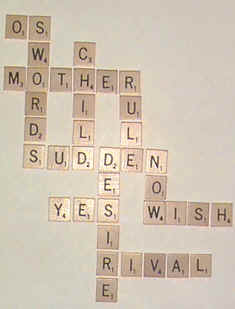
Her mouth slightly agape, my mother looks at me strangely, then asks what word I'm spelling. "Oh," I say, "it could be the plural of the letter O, like my morning "Cheerios." But it's really Oz." (I'm trying not to smile.) "You know," I continue. "Dorothy, Toto, the Wicked Witch, the yellow brick road" (to the unconscious). Still staring strangely at me, she slowly nods and says, "Well, it's really OZ, but I suppose we can relax the rules a bit, since it's such a magical place and you're such a clever little boy. But since you're revising the rules, I'm going to follow suit." (My mother loved her bridge.) With a gleam in her eye, she makes her next move, in the lower left:
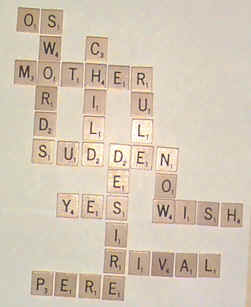
"What's that?" I ask. Smiling, then suddenly pensive, she replies: "Oh, it could be peer, as in 'look,' or pear, as in fruit, or pair, as in socks." By now we've thrown caution to the winds; all is permitted. I've been looking for a good place to put one of my big letters, and now find occasion at the bottom:
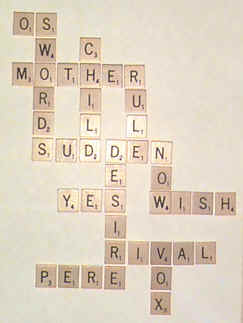
"And what might that be?" asks my mother. Giggling, I suggest it could be the vox who tries to get into the henhouse when the farmer is away. (We had read stories about this, she and I.) We both are pleased with this bit of kindergarten wit, and my mother ventures upon a lecture. "Actually, she begins, "our language--you know, English--isn't the only language. There are many, many others, spoken and written by people all over the world. And what you've just created . . . ." Just then the back door banged opened and my father's booming baritone called out, "I'm home! Is dinner ready?" Quickly my mother said, "We have to stop. Since you started, I'll finish my turn, and you can add up the scores." She placed her final tiles at the top.
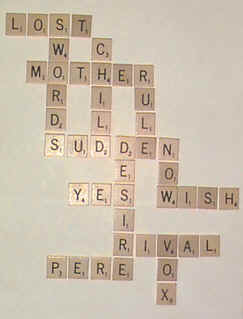
When my mother left the table and went into the kitchen, I started adding the scores. After all the double letters and such, I managed a three-point victory: 82 to 79. I won, I thought. This satisfaction wasn't great, but it was good enough. In the kitchen I could hear my parents talking, low and steady.
A few decades later, my own styles of textual reception and production (call them reading and writing) privilege the visual and aural. In an interview, Don DeLillo once said that he wrote on a manual typewriter so he could feel the physical impression of his text as he created it. My style is different: I focus on the sight and sound of words, and their relative positions. My interpretive reading mode is a type of generative acid (both solvent and drug): it partially dissolves texts into a sort of semantic stew, which I can stir at will and then fantasize about in a monitored free association. Within this lax yet lucid reconstruction of texts, conventional syntax surrenders to latent sense. Freud referred to this process as "syllabic chemistry."3
This essay is an exhibition -- artificially autobiographical and necessarily narcissistic -- of a personal belief that my adult, academic relation to language rests on and derives from my childhood, and a particular kind of childhood play. As I reconfigure the event, playing SCRABBLE with my mother represents and reanimates a potential space of linguistic co-production between mother and child (see Winnicott 1971, 1-28; 95-110). It's a later developmental model, or high-level, sublimated scene of earlier primordial relationships, such as reading with mother and being read to by mother. On the foundational ground of a semiotic orchestration of language (the Kristevan chora), the newly literate child learns the powers and limits of a semantic or syntactic organization of language (see Kristeva 1974). From an arbitrary parataxis of discrete letters resting in potentia side by side (in a wooden frame, or in an alphabet), he or she arranges a lexical syntaxis of singular meaning within the delimited field of play.4
When my mother and I played, I don't recall my father in the scene. He was probably at the office, or on the golf course, or on the way home for dinner. Yet he was still present: in the household economy, in the authoritative dictionary, on the underside of the box top with the rules, or in that proper and propertied sign, the superscript trademark ® that registers and owns the very term itself: SCRABBLE® . Perhaps a primordial agon is adumbrated in the simple colors of the board: a field of sublimated struggle between maternal and paternal linguistic principles, marked by the conventional casts of gender, pink and blue.
The word "scrabble" itself has real lexical value: it's not a commercial invention. As a verb it derives from (1) scrape, to pull together with one's hands. It then branches into the senses of (2) struggle, and (3) scribble: writing as scratching. Thus the term gestures toward the primitive and preverbal--a scrabbled-together mix of elements in the struggle for life--as well as toward the sophisticated and literate, a scribbled articulation of written expression. It denotes the manipulation of language at both crude and subtle levels. To me, literature means more if I can get my hands on it, scrabbling it into a new amateur edition: ScrabbLit.
Les mots sous les mots: Lacan over Kristeva, with Bakhtin dialogically or ambivalently on the side. The scrabbled field of discourse reaches out literally in two dimensions toward semantic sense, while it reaches figuratively down into other dimensions: into (a) pre-existing texts and conventions that define a language or discourse (Bakhtin), and (b) the preverbal matrix that structures or anchors linguistic development (Kristeva). It is a playful enactment of phenotext on genotext. It sketches a transcendent intertextuality of literary, linguistic, and preverbal registers of language. As Kristeva puts it:
The genotext can be seen as language's underlying foundation. We shall use the term phenotext to denote language that serves to communicate . . . . The phenotext is constantly split up and divided, and is irreducible to the semiotic process that works through the genotext. The phenotext is a structure . . .; it obeys rules of communication and presupposes a subject of enunciation and an addressee. The genotext, on the other hand, is a process; it moves through zones that have relative and transitory borders and constitutes a path that is not restricted to the two poles of univocal information between two fully fledged subjects (Kristeva 1974, 121).
The SCRABBLE board game constructs a space-between that connects as it separates, like a bridge or a copula. Within this space a child can discover the dynamic of lexical possibility and restriction, propriety and impropriety, enclosed within the shifting authorities of the mother's voice and the father's law. The thrill of victory within the jouissance of play. Writing about the place of identification in analysis, Kristeva implicitly describes the act of deciphering scrabbled language:
The analyst situates himself on a ridge where, on the one hand, the "maternal" position--gratifying needs, "holding" (Winnicott)--and on the other the "paternal" position--the differentiation, distance and prohibition that produces both meaning and absurdity (Lacan) [my interpolation]--are intermingled and severed, infinitely and without end (1983, 246).
(To be sung)
![]() is for the many things she gave me.
is for the many things she gave me.
![]() is for the Other that she was.
is for the Other that she was.
I could go on. I is for the self she helped to form. Or T is for the word she helped me form. Both constructs are partly out-of-bounds formations, sous table, only marginally suitable, occasionally in another tongue (a romance language). The game is a primary stage of my m.o., my modus operandi. But before my harmonized sentimentality of a re-staged mother-and-child reunion dissolves into clumsy three-stooged clowning -- where Moe, Curly, and Larry wait in the wings -- I'd better end the game and return the tiles to the box. Modus operandi interruptus.
Bakhtin, Mikhail. The Dialogic Imagination: Four Essays by Bakhtin. Trans. Emerson and Holquist. Austin: University of Texas Press, 1981.
Klein, Richard, ed. The Tropology of Freud. Diacritics 9 (1979).
Kristeva, Julia (1974). "Revolution in Poetic Language." In Moi (1986), pp. 89-136.
____________ (1980). Desire in Language. Trans. Gora, Jardine, and Roudiez. New York: Columbia University Press, 1980.
____________ (1986). "Freud and Love: Treatment and its Discontents." In Moi (1986).
Lacan, Jacques. "The Rome Discourse" ("The Function and Field of Speech and Language in Psychoanalysis" [1953]), Écrits: A Selection, trans. Alan Sheridan (New York: Norton, 1977).
Moi, Toril, ed. The Kristeva Reader. Oxford: Blackwell, 1986.
Pinker, Steven. The Language Instinct: How the Mind Creates Language. New York: Columbia University Press, 1994.
Shakespeare, William. Hamlet (1599).
Willbern, David. "Freud and the Interpenetration of Dreams." In Klein, ed.,The Tropology of Freud, pp. 98-110.
Winnicott, D.W. Playing and Reality. London: Tavistock Publications, 1971.
NOTES
1I thank Dan Weinstein and Peter Mathews for their help in formatting the graphic images and translating this essay into HTML code.2 Invented in Poughkeepsie, New York, in the 1930s, the game was marketed in the U.S. by Parker Brothers. In 1994 another American game company competed with Parker Brothers for U.S. distribution rights. At the same time, different vocabulary restrictions were placed on usage. While Britain liberalized the rules to admit slang, profanity, and even racist terms, the new American edition excluded such terms, and edited out about one hundred previously acceptable words that might be considered racist, sexist, or politically incorrect. (Reuters news report, September 1994.)
3 The phrase is in The Interpretation of Dreams (1900), one of my favorite and formative books (those rebuses! those cross-language puns!). See The Standard Edition of the Complete Psychological Works of Sigmund Freud, ed. Strachey et al., 24 vols. (London, 1956), vol. 4, p. 297. One of my own critical productions is an essay on "The Interpenetration of Dreams" (1979) in which I assert that interpretation can be oedipal: a type of textual intercourse.
4 Steven Pinker (1994) has described Chomskyan linguistics and current psycholinguistics whose theories push language acquisition further back, deeper than the maternal chora, into the neural networks of the brain. Contemporary psychoanalysis, like gender theories a theory at the interface of biology and sociology, needs to come to terms with the new "essentialisms."
Received: June 1, 1999, Published: September 10, 1999. Copyright © 1999 David Willbern
